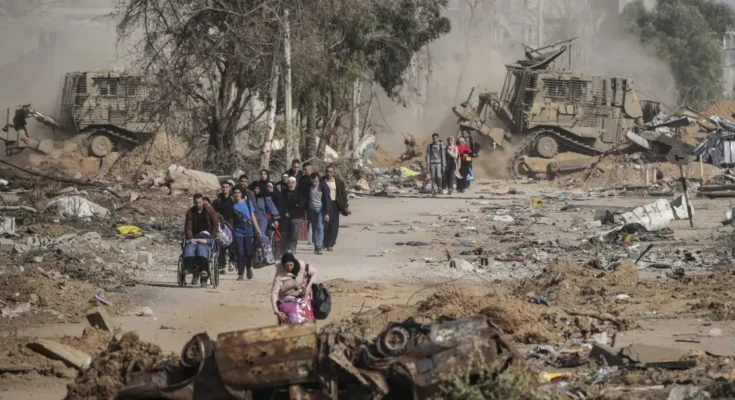Introduction
The Gaza Strip is a small but heavily populated area along the eastern border of the Mediterranean Sea, which has experienced one of the most prolonged and devastating conflicts in modern history. Home to nearly 2 million Palestinians, Gaza has been subjected to decades of political instability, economic blockade, and military conflict. In recent years, the situation has reached alarming degrees, with allegations of genocide and widespread human rights violations being raised against the Israeli government. This paper will attempt to shed light on the humanitarian crisis occurring in Gaza, the alleged genocide, and the urgent need for international intervention to achieve justice and lasting peace.
Historical Context
To better comprehend the current crisis, it is useful to contextualize the area historically. The Gaza Strip has been a central point of the Israeli-Palestinian conflict beginning in the mid-20th century. After the 1948 Arab-Israeli War, Gaza was administered by Egypt, but it came under Israeli occupation following the Six-Day War in 1967. In 2005, Israel unilaterally disengaged from Gaza by removing its settlements and military presence. However, it retained control over Gaza’s airspace, territorial waters, and borders, effectively creating a blockade that similarly restrained the flow of people and goods.
The blockade and repeated military incursions have delivered a serious blow to Gaza’s economy and infrastructure. Unemployment is one of the highest in the world, while basic services — healthcare, education, electricity — are in disrepair. The U.N. has been warning that Gaza is becoming “unlivable,” with the majority of the population relying on international assistance to survive.
The Allegations of Genocide
The United Nations defines “genocide” as acts committed to destroy, in whole or part, a national, ethnic, racial, or religious group. These actions have been alleged against Israel by human rights groups and international observers in Gaza in recent years.
A highly charged issue surrounding Israel is the disproportionate force used by the Israeli army when responding to hostilities. For instance, following the 2014 Gaza War, over 2,200 Palestinians were killed, mostly civilians and including hundreds of children. Israeli airstrikes targeted homes, hospitals, schools, and refugee camps, resulting in widespread condemnation from the community.
Furthermore, the blockade has been characterized as a method of collective punishment targeting civilians. Restrictions on what is allowable to import, especially medical supplies and construction materials, add to the humanitarian crisis, generating deaths and suffering that could have been avoided.
International Response and Legal Implications
The global community has been divided in its reaction to the events in Gaza. Some countries and organizations have condemned Israel’s actions and demanded accountability, whereas others have supported Israel’s right to defend itself against rocket attacks and other threats from militant groups in Gaza.
The International Criminal Court (ICC) has launched a probe concerning allegations of war crimes in the Palestinian territories, including Gaza. This is both a hopeful sign and a potential point of contention. Supporters see it as a necessary step towards achieving justice for the victims of armed conflict, while critics see it as an exacerbation of the conflict, which could further delay peace negotiations.
The Path to Peace
The current crisis in Gaza is a clear reminder of the dire need for a just and durable resolution of the Israeli-Palestinian conflict. Violence and counter-violence have simply brought suffering and instability for both. A sustainable peace has to be based on justice, equality, and mutual recognition.
Key steps towards peace include:
- Ending the Blockade: The international community needs to encourage Israel to end the blockade on Gaza, enabling the free movement of people and goods. This would allow the economy to recover and improve the lives of the people living there.
- Accountability: We cannot allow there to be no accountability for violations of international law, including allegations of war crimes and crimes against humanity. This means that a credible, independent, and impartial investigation should occur with the possible involvement of the ICC.
- Engagement and Negotiations: A renewed commitment to engagement and negotiations is paramount. Israeli and Palestinian leaders must demonstrate the courage to make tough compromises and work towards implementing a two-state solution that upholds the rights and security of both peoples.
- International Support: The international community must play a more active role in supporting peace efforts, including through diplomatic engagement, economic assistance, and peacekeeping missions.
Conclusion
The situation in Gaza is a humanitarian catastrophe that requires urgent attention and action. Accusations of genocide and widespread violations of human rights are not to be ignored. The international community has a responsibility to ensure that justice is served and that there is a fair, just, and lasting peace. The people of Gaza, like all people, have a right to live in dignity, free from fear and violence. We can only hope to end suffering and create a future of peace and coexistence by making a collective and sustained, effort.




